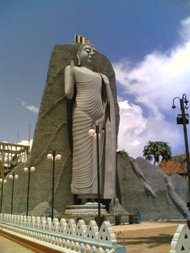Protect your child from dark side of Internet
President of Sri Lanka, Mahinda Rajapaksa recently ordered to impose a ban on immoral websites. Such websites have become a major social menace not only in Sri Lanka, but in all over the world. A clash erupted at the University of Colombo a couple of weeks ago resulting in its closure. The incident that triggered this University clash was also a 'video clip' posted on the Internet. These incidents prompted me to write this short article on the dark side of information and communication technology (ICT), in particular the computers connected to the Internet.
This is the era of ICT. Governments pump in millions of rupees for the development of the ICT sector. Most parents try their best to expose their children to this 'wonder' machine, the computer. However, we must not ignore the fact that there is a dark side to this extremely powerful and eminent technology. Do we place adequate significance to the dark side of ICT?
Beware! The unreserved use of an Internet has the power to ruin your child's entire life. Some of us never see the dangers of this side of ICT. The focus of this article is the computers connected to Internet. Internet is the communication network that connects millions of computers all over the world via satellites and other communication links. It is timely that as responsible citizens and child-loving parents we understand the dangers of inappropriate use of this feature of ICT. That is the dangers and the ways of protracting our kids from the improper use of computers connected to internet.
Power ICT
The enormous power of ICT is uncontested. It is like atomic energy. Atomic energy has many great uses; it powers the rocket engine that goes to moon; it produces electricity to light millions of houses and thousands of factories. However, used maliciously the atomic bomb can destroy cities and communities in a second; see what happened in Hiroshima. ICT is no difference!
Before going into this matter, may I narrate two stories; one from Sri Lanka and the other from New Zealand.
One Sri Lankan family migrated to New Zealand in 1995. The parents' main aim was to provide 'best quality' education for their only daughter. This family was exposed to the modern world, only when they all landed in this foreign soil. The language, culture and the social norms of the west were new to these parents. Being young, the daughter naturalised into the new environment much faster than the parents did.
They love their daughter so much that all her needs were fulfilled with no hesitation. As a result, the daughter got a state-of-the-art home computer as her 10th birthday present. This was with full Internet facilities. The new computer in her room became her 'pet'. Daughter was now 'using' the computer extensively. Once her mother said: (with a bit of pride of course) "you know, our daughter is always "working" in the computer, even up to mid night".
They did not know what this child was up to. Few years later, the daughter miserably failed her exams and 'ran away' with her 'boyfriend'. Poor parents realised only then that the girl had had met her boyfriend over the Internet. Subsequently, the 'boyfriend' was found to be an agent of a gang member involved in a ring of sex industry.
The second case is about a teenager who got addicted to computer games. His father was a consultant medical officer in Sri Lanka. Mother was an accountant. Both parents were busy with work and had been having a good income too. In order to keep the son occupied in 'productive' activities and as a means of exposing him to the 'knowledge society', a powerful computer equipped with many educational programmes and games entered the household.
By the time the boy reached fifteen, he became a computer addict and was also heavily involved with gambling through the Internet. He has secretly used mother's credit card for Internet payments. Ultimate result is that the son is now undergoing psychiatric treatment.
In both these cases, the inappropriate use of the computer and Internet ( i.e. ICT) was the main reason for ruining these children's lives. Who is at fault?
Now we will turn into some of the potential dangers of ICT.
Internet (connected with computers) is used extensively to promote and solicit immoral sexual behaviour. How can an innocent machine like a computer promote sex? It is not the computer, but the malicious people behind the ICT. These boorish minority are in a way sex maniacs or psychopaths, or rude businessmen who place money before humanity. They misuse this extremely powerful tool to make money, in one of the most unethical ways.
Internet gambling
Following words of David Partenheimer is adequate to understand the disastrous impact of Internet gambling.
"People who use the Internet to gamble may have more serious gambling problems than those who use slot machines or play the lottery, according to a new study that is among the first to evaluate the prevalence of Internet gambling.
The study warns that the explosive growth of the Internet is likely to lead to more on-line gambling opportunities and the health and emotional difficulties that come with gambling disorders, including substance abuse, circulatory disease, depression and risky sexual behaviours." (Ref: Psychology of Addictive Behaviours, a journal of the American Psychological Association).
Dangerous drugs
Today, the Internet has become an extremely popular 'drug shop'. Drugs are advertised on the Internet and any person can buy them electronically (e.g. using credit cards, electronic funds transfer) without any restriction.
The problem in this business is that there is no control over the sales. If it is in a country, the laws of the land governs the businesses operations.
For example, in Sri Lanka, the sale of certain dangerous drugs are totally banned; alcohol and cigarettes cannot be sold to under 18s. The business on the Internet has no boundaries; no geographical barriers. That is the danger!
United Nations warns that some of these banned drugs are associated with 'lifestyle' enhancements. One of the difficulties facing the medical profession is how to curb these so-called 'lifestyle' medicines.
Some drugs sold on the Internet are fake and contain ingredients bearing little resemblance to the medicine named on the bottle.
In one example, a 64-year-old woman in the UK had taken the drug through Internet for four years after making a self-diagnosis of chronic fatigue syndrome. In February 2006, she was admitted to a public hospital complaining of failing eyesight. The doctors diagnosed that she had glaucoma and cataract, caused by the excessive doses of 'steroids' (the active ingredient contained in the drug prednisolone). Later, the doctors found over 1,000 websites selling prednisolone tablets.
Marijuana (and heroin) is always one of the top 100 words looked up on the Internet search engines. This means the Internet users can 'type the word' and search these words most frequently. People who promote marijuana know that teens spend more time online than any other age group and target much of their advertising directly to children and teens.
Danger of social networks
There are a number of free chat rooms, also called social networks, in the Internet. MySpace, Facebook, are to name a few.
Anyone can join these social networks and make "friends' with others and 'chat' through the Internet.
Not only they can talk, these sites are full of variety with text (written communication), audio, video, animation, movies, graphics, etc.
These networks have become extremely popular, especially among children and young.
Virtually no extra cost is involved in joining these social networks.
Dangers of social networks are manifold. It is an utter waste of time, if you are not talking something useful. These 'sampappralapa' chats may eat into many hours of your precious time. Some teenagers spend the whole night chatting.
Certain online activities are illegal.
They may download music, video etc without licence.
One other snag is divulging personal information through Internet and that may lead to many forms of crime. As well as leaving yourself open to theft, personal information can be used by identity thieves to open loans and credit cards in your name. Only a small amount of personal information is needed for these criminals. Certain teenagers have listed not only their names and addresses, but even cell phone numbers and after school schedules.
Another major worry in the minds of Internet safety experts is the dangers of posting party invitations onto social network sites. These 'parties' can be of many forms; some may propagate sex; others the drugs like marijuana.
Community responsibility
This article presented a number of potential dangers of inappropriate use of Internet particularly for children and teenagers. Though there are many benefits of ICT, which we have not discussed here, we can see that computer (Internet) can cause much harm to society, if not used carefully.
However, this article in no way suggests that we must avoid (or not promote the growth and development of) ICT. Our closest neighbour, India has shown the world that ICT can be a major engine of growth. On the other hand, we have to embrace ICT, whether we like it or not. That's the global trend! The reader must be warned not to form a negative image of the ICT after reading this article. All what's needed is to use this powerful tool with extreme care. We must find suitable strategies to use this enormously powerful tool in a productive manner. In particular, we ought to find ways of protecting our very own children - the ever loving sons and daughters, the future leaders, of our soil - from the potential dangers of ICT. Certain nations have taken this issue very seriously and have taken major steps, individually and collectively, towards correcting the situation.
The recent directive of our president mentioned at the beginning is praiseworthy; but that itself could not make the change. We all have to act swiftly. Otherwise Sri Lanka may also become 'famous' for 'online computer abuse', as some western countries are. It's our role. It is quite timely that we, the parents, elders and professionals, take a deep breath and think through to look after our next generation from the dark side of ICT.
The writer is the Head, Department of Information Systems and Business Management of the Sri Lanka Institute of Information Technology, Malabe.





















































No comments:
Post a Comment